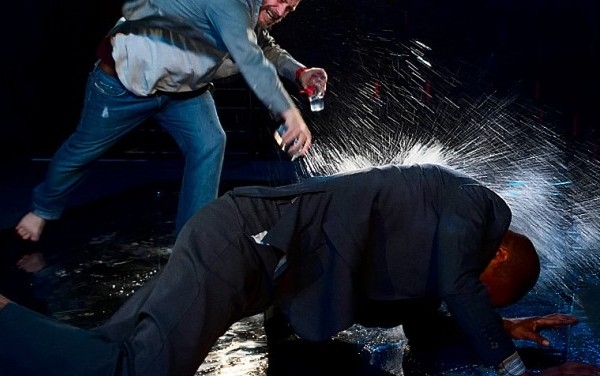Idomeneus (Gate Theatre)

© Bil Knight
Over at the Almeida, Mr Burns is imagining the storytelling of the future, putting an episode of The Simpsons through a post-apocalyptic game of Chinese whispers. On the other side of London, meanwhile, Idomeneus explores a mangled narrative that is already thousands of years old. Roland Schimmelpfennig‘s play, here translated by David Tushingham for its UK premiere, is nominally about the Cretan king and his experience in the aftermath of Troy. But really, it’s all about stories.
In Ellen McDougall‘s playful version, this fragmented and contingent rendering of the centuries old myth is told by a cast of five. They enter one by one, awkward and fidgeting, stumbling over one another in their eagerness to share the story. The collective power of the Greek chorus transformed into a gaggle of giggling players. Speaking at the same time, interrupting one another, throwing grinning asides at the audience, they muddle their way through all the "ifs" and "maybes" of a tale that has already been through generation upon generation. We know that Idomeneus has returned from war in Troy, buying his survival with a promise of sacrifice, but everything else is up for grabs. All the original certainties have been flattened out into countless possibilities, until the very act of telling is riddled with narrative potholes.
McDougall’s production is bursting with the glee of invention, each sentence of its visual language creating the illusion of inspired spontaneity. When water is thrown across the stage, it is with the shock and joy of new possibility. The scribbling of cocks on the wall with chalk is imbued with brilliantly childish naughtiness, as is the later explosion of party poppers. And juxtaposed with this delight is the surprising brutality of McDougall’s simple visual metaphors for violence. A piece of chalk ground to dust or sudden, vivid splashes of ink – history literally written on the body – effortlessly conjure the crushing of bones and the spilling of blood.
This gloriously messy, water-drenched staging plays out in Ana Ines Jabares Pita’s blank blackboard of a set, its surfaces just waiting to be written on. The more tangled the story and its multiplying possibilities, the more cluttered and chaotic the stage becomes, until the performers are left sitting amid the anarchy, looking in disbelief at what they have made. It’s telling that the only recognisable visual reference to the narrative is an upturned paper ship that dangles from the ceiling – delicate, flimsy, just waiting to be ripped down.
The ancient narrative too gets a pummelling, frequently sideswiped by cries of "it wasn’t like that, that’s not what happened". By restlessly reshuffling this tale, Schimmelpfennig – and McDougall in this appropriately irreverent production – demonstrate both the instability and the mutability of stories. In just one of many "what ifs", we see Idomeneus’s son Idamantes sail off into the sunset with Electra under a shower of rose petals, with the suggestion that "everything could be different". And here lies the piece’s playful power. If stories can be told and retold and retold again, then the ending can be changed. Everything could be different.
Idomeneus runs at the Gate Theatre until 19 July.










